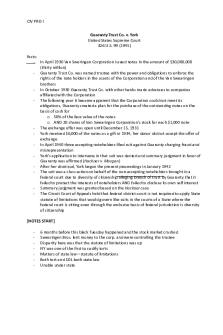Wilson v. Lane - Briefs for Trust and Estates PDF

| Title | Wilson v. Lane - Briefs for Trust and Estates |
|---|---|
| Course | Trust and Estates |
| Institution | Touro College |
| Pages | 2 |
| File Size | 68.4 KB |
| File Type | |
| Total Downloads | 50 |
| Total Views | 136 |
Summary
Briefs for Trust and Estates...
Description
Wilson v. Lane (2005) Procedural history: o After executrix Katherine Lane offered Jewel Jones Greer’s 1997 last will & testament for probate, Floyd Wilson filed a caveat, challenging Greer’s testamentary capacity o A jasper county superior court jury found that greer lacked testamentary capacity at the time she executed her will, but the trial court granted Lane’s motion for judgment notwithstanding the verdict o Wilson appeals o Because we agree that there was no evidence to show that Greer lacked testamentary capacity, we affirm. Facts: o The will in question distributed Greer’s property equally to 17 beneficiaries, 16 who are blood relatives to Greer, the only non relative was Lane, who spent much of her time caring for Greer b4 her death in 2000. o The drafting atty testified that in his opinion, at the time the will was signed Greer was mentally competent & other friends and acquaintances testified that Greer was competent Parties arguments: o The propounders established a presumption that Greer possessed the testamentary mental capacity o The caveators, never presented any evidence whatsoever showing that Greer was incapable of forming a decided & rational decision as to the disposition of her property They challenged greer’s capacity by showing that she was eccenteric, aged, and peculiar in the last few yrs of her life See p. 162 for some examples used by the caveators However, although perhaps persuasive to a jury, “eccentric habits & absurd beliefs do not establish testamentary incapability” All that is required to sustain the will is proof that Greer was capable of forming a certain rational desire w/respect to the disposition of her assets o The caveators introduced other evidence however none was sufficient to deprive greer of her right to make a valid will, as none of it showed that she was incapable of forming a rational desire as to the disposition of her property Courts reasoning: Even though the doctor referred to greer having “senile dementia” it cannot eliminate testamentary capacity. If it could it would undermine societal confidence in the validity and sanctity of our testamentary system. o In this case, no testimony, expert or otherwise was offered to establish that at the time the will was executed, greer suffered from a form of dementia sufficient in
form or extent to render her unable to form a decided and rational desire regarding the disposition of her assets o None of the evidence, either alone or in combination, provided any proof that Greer lacked testamentary capacity as that term is defined in this state o At most there was some evidence that Greer was eccentric and whose mental health declined toward the end of her life, accordingly the evidence demanded a verdict upholding the validity of her will, and trial court was correct to reverse the jurys contrary verdict o Judgment affirmed! DISSENT: o Believes that the caveators introduced medical evidence showing that Ms Greer was in some form of early to middle stages of dementia of the alzheimers type & that her own doctor a yr earlier said she exhibited “senile dementia” o She appointed a guardian which was supported by an affidavit by her doctor saying she had “dementia alzheimers type” o Doctors indicated she was incapable of managing her property o Want to piece together the “totality of the evidence” HOLDING: Testator had capacity to make a will It went to jury and they found that Greer lacked a capacity and the court entered a JNOV, Why did the court enter a Judgment NOV? (JNOV) Lane WHAT IS the burden of proof in this case? In Georgia? o Preponderance of the evidence Who must prove capacity? Or disprove capacity? o The contestant has the burden and it is by the preponderance of the evidence Top of p. 163 we have a discussion of the guardianship petition that was filed… whats the relevance of the guardianship petition? o It was filed because she couldn’t take care of herself but the court rejected this argument because Why is she operating under an “insane delusion” ? o She had all these hallucinations and had all types of phobias o In order for a will to be contested based on insane delusion, what must be demonstrated? That the delusion effected the disposition, either it was a material effect or it may have had some effect, so in this case there would need to be a relationship between the delusion and the will provision...
Similar Free PDFs
Popular Institutions
- Tinajero National High School - Annex
- Politeknik Caltex Riau
- Yokohama City University
- SGT University
- University of Al-Qadisiyah
- Divine Word College of Vigan
- Techniek College Rotterdam
- Universidade de Santiago
- Universiti Teknologi MARA Cawangan Johor Kampus Pasir Gudang
- Poltekkes Kemenkes Yogyakarta
- Baguio City National High School
- Colegio san marcos
- preparatoria uno
- Centro de Bachillerato Tecnológico Industrial y de Servicios No. 107
- Dalian Maritime University
- Quang Trung Secondary School
- Colegio Tecnológico en Informática
- Corporación Regional de Educación Superior
- Grupo CEDVA
- Dar Al Uloom University
- Centro de Estudios Preuniversitarios de la Universidad Nacional de Ingeniería
- 上智大学
- Aakash International School, Nuna Majara
- San Felipe Neri Catholic School
- Kang Chiao International School - New Taipei City
- Misamis Occidental National High School
- Institución Educativa Escuela Normal Juan Ladrilleros
- Kolehiyo ng Pantukan
- Batanes State College
- Instituto Continental
- Sekolah Menengah Kejuruan Kesehatan Kaltara (Tarakan)
- Colegio de La Inmaculada Concepcion - Cebu















